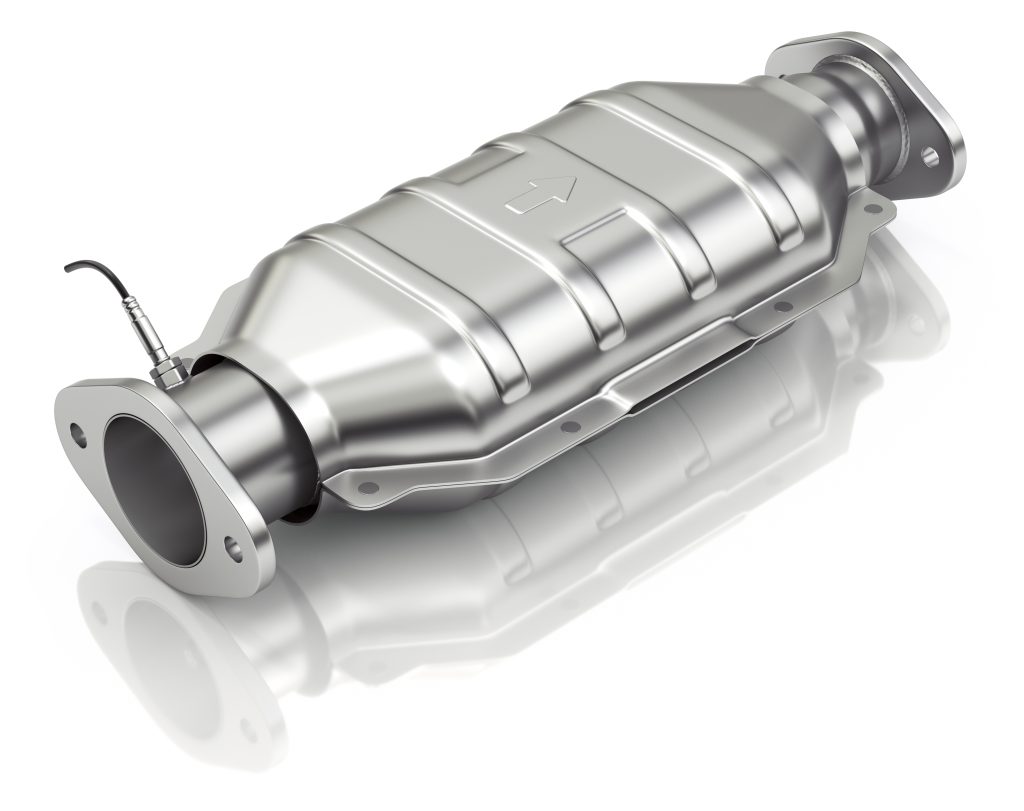Recently, one of our Kunes dealerships in Madison, Wisconsin, had 16 catalytic converters stolen off new cars on the lot. The vehicles stolen were all Mitsubishi Outlander Sports. Nine of them were new and the rest a range of used.
The job was completed by two suspects and took just under an hour. With theft of catalytic converters skyrocketing due to their value, here’s a rundown of what they are, how they work, and how to prevent your vehicle from being a target.
What is a catalytic converter?
Since 1975, catalytic converters were introduced and installed on vehicles, turning toxic fumes from the vehicle’s engine into less harmful gasses for the environment. They play a large role in reducing air pollution from gas-powered vehicles, including hybrids and trucks. The first widespread introduction of catalytic converters was in the United States to comply with the U.S. Environmental Protection Agency’s stricter regulation of exhaust emissions.
Why is theft of catalytic converters on the rise?
Catalytic converters are incredibly easy to steal because of their external location. Since they’re made with valuable precious metals, including platinum, palladium and rhodium, catalytic converter thieves are ripping them from cars at an increasing rate.
Removing a catalytic converter takes only minutes using some basic, readily available, battery-operated tools from a local hardware store. A stolen catalytic converter can generate hundreds of dollars, according to a 2021 report by the Congressional Research Service, and could cost an owner $3,000 to replace the part – not to mention finding alternate transportation.
As the value of the precious metals remains high, so do the number of thefts of these devices. There is a clear connection between times of crisis, limited resources, and disruption of the supply chain that drives these thefts.
According to the National Insurance Crime Bureau, “The values of the precious metals contained inside catalytic converters today is staggering. As of March 2022, rhodium sits at $20,000 per ounce; palladium at $2,938 per ounce; and platinum at $1,128 per ounce.”
Which vehicles have been targeted the most?
Carfax used data from catalytic converter replacement service records from 2019 through the first three months of 2020 to compile a list of the car models most likely targeted by thieves. Here is a sample of their findings.
MOST TARGETED CARS NATIONWIDE
Nationally, there’s a range of vehicles in play. Not surprisingly, some of the most popular nameplates of the past two decades are among the top targets. What is most surprising is that it’s not just one manufacturer, nor just one body style. Targeted vehicles range from small cars, such as the Chrysler 200, to SUVs such as the Honda CR-V or Chevy Equinox, all the way up to full-size pickup trucks from Ford and GM.
CARS MOST LIKELY TO HAVE THEIR CATALYTIC CONVERTERS STOLEN NATIONWIDE
- 1985-2021 Ford F-Series
- 1989-2020 Honda Accord
- 2007-17 Jeep Patriot
- 1990-2022 Ford Econoline
- 1999-2021 Chevrolet Silverado
- 2005-21 Chevrolet Equinox
- 1997-2020 Honda CR-V
- 1987-2019 Toyota Camry
- 2011-17 Chrysler 200
- 2001-21 Toyota Prius
MOST TARGETED CARS IN THE MIDWEST
The Midwest list is a blend of other names from the area, with the Chrysler 200 significantly higher there and the Honda Accord much lower, but still in the Top 10.
CARS MOST LIKELY TO HAVE THEIR CATALYTIC CONVERTERS STOLEN IN THE MIDWEST
- 1985-2021 Ford F-Series
- 2007-17 Jeep Patriot
- 2011-17 Chrysler 200
- 2005-21 Chevrolet Equinox
- 2008-14 Dodge Avenger
- 1990-2022 Ford Econoline
- 1997-2020 Honda CR-V
- 1999-2021 Chevrolet Silverado
- 1987-2019 Toyota Camry
- 1989-2020 Honda Accord
Trucks are easy targets because of their high clearance from the ground to the undercarriage, providing easier access. Hybrid cars don’t rely heavily on the catalytic converter which means they’re typically cleaner and in better condition, commanding more value. Thefts in Hybrids have ticked up over the past two years as they have become more prevalent on the market.
How can I protect myself from catalytic converter theft?
Thieves only need a few minutes alone with your vehicle to steal your catalytic converter, since they are easy to remove.
Police departments advise parking in closed garages whenever possible. If that’s not feasible, try parking in a brightly lit or busy area, or one with security cameras, as a theft prevention strategy; this way thieves won’t have the opportunity to remove your converter without being spotted. Avoid leaving your ride in parking lots designed for commuters; thieves know that cars there will be left unattended for the entire day (or night in Madison Mitsubishi’s case), and might be planning to hit a slew of vehicles in one lot all at once.
If you think your vehicle is a target, an aftermarket catalytic converter theft prevention device can be installed by a mechanic for a fee. This anti-theft device makes it harder to remove the converter and typically comes in the form of a shield, or a cage.
Having the right car insurance for your car is important when it comes to catalytic theft. For example, if you have comprehensive coverage, it covers catalytic theft and the cost of a new replacement catalyst. So if you are worried about catalytic converter thefts, it is important to check these things before you get insurance for your vehicle.
What happens if your catalytic converter is stolen?
When you start your car, you’ll know by the loud exhaust noise if your catalytic converter was stolen. Here are a few steps that can get you going again:
- Ask your mechanic if driving your car without the catalytic converter will further damage it. If not, drive only to the repair shop.
- Contact your insurance company and take pictures of the damaged exhaust pipe where the catalytic converter used to be.
- File a police report, which can easily be done online in many jurisdictions. This will help police track such crimes and might assist in arrests.
- While your new catalytic converter is being installed, ask the repair shop about adding an anti-theft device to prevent future thefts.
If you are looking for an anti-theft device for your catalytic converter, feel free to give us a call at 608-719-4103 or contact us for more information.



